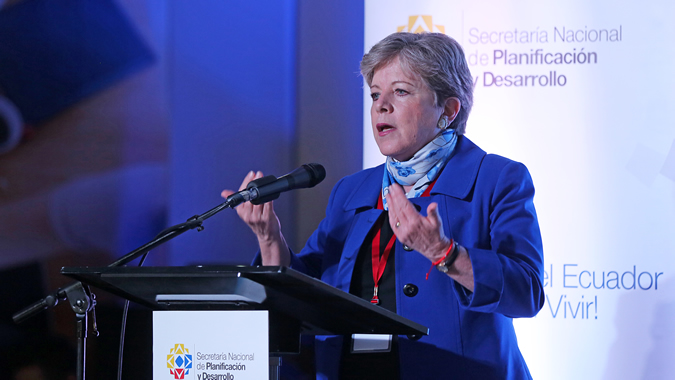ECLAC Defends the Role of Planning for Successfully Implementing the 2030 Agenda
Work area(s)
Delegations from 18 countries participate in the XIV Conference of Ministers and Heads of Planning of Latin America and the Caribbean in Yachay (Ecuador).

The Executive Secretary of the Economic Commission for Latin America and the Caribbean (ECLAC), Alicia Bárcena, defended today the role of planning in changing economic and social structures and successfully implementing the 2030 Agenda for Sustainable Development. She spoke at the inauguration of the XIV Conference of Ministers and Heads of Planning of Latin America and the Caribbean in Yachay (Ecuador), where she was joined by Ecuador’s National Secretary for Planning and Development, Sandra Naranjo.
“We need you to help us imagine 2030,” said the senior United Nations official before representatives from 18 of the region’s countries and international organizations. “You can be the great participants who develop political agreements with a long-term view and a culture of collective development. The State must outline this strategic vision and ensure the provision of public goods,” Alicia Bárcena stressed.
The 2030 Agenda, which has 17 goals and 169 targets and was approved in September by 193 countries at the United Nations General Assembly, has a “civilizing character since it puts people at the center and cares for the planet,” she explained. She cited as examples the goals for eradicating poverty—“the only acceptable poverty figure is zero,” she said—and for fighting climate change (“it is possible that we will be the last generation that can do something to revert it,” she warned).
According to Alicia Bárcena, planning is also necessary to confront the “tectonic changes” occurring at a global level, such as the reorganization of international politics and of the global economy in new trade blocs; the decoupling of the financial economy and the productive economy; the alteration of migrant flows; and vulnerability in the face of climate change.
During her welcoming remarks, Ecuador’s National Secretary for Planning and Development, Sandra Naranjo, defended the role of planning and the stewardship of the State and recalled that Yachay, where the meeting is being hosted, is a city planned for thinking. Naranjo also said that good investment, both in the social and infrastructure spheres, is the best way to save and to boost growth.
During the meeting officials will present a summary of the document The State of the Art and Challenges of Planning for Development in Latin America and the Caribbean, the result of an ongoing study by the Latin American and Caribbean Institute for Economic and Social Planning (ILPES), to get feedback from countries and prepare a broader version to be published in 2016.
After this meeting, on Thursday, November 19, the XV Meeting of the Regional Council for Planning will take place at the Yachay Tech University. This council is an intergovernmental subsidiary body that orients the activities of the ILPES and whose sessions coincide with the Conference of Ministers. At this gathering, which will be closed to the public and will be intergovernmental in nature, officials will review the activities carried out by the ILPES in 2014 and 2015 along with the working program for the 2016-2017 period, which will include a proposal on training regarding the 2030 Agenda.
More information at:
- Web site of the XIV Conference of Ministers and Heads of Planning of Latin America and the Caribbean.
For queries and interviews, contact María Amparo Lasso, Chief of ECLAC’s Public Information Unit. E-mails: prensa@cepal.org; mariaamparo.lasso@cepal.org; Telephone: (56) 22210 2040. Follow us on Twitter, Facebook, Flickr, YouTube and Google+. Join the conversation on social media using the hashtags #planningLAC in English and #planificaciónALC in Spanish.
Related content
La Agenda 2030 para el Desarrollo Sostenible: perspectivas latinoamericanas y caribeñas
Presentación de Alicia Bárcena, Secretaria Ejecutiva de la CEPAL, en la XIV Conferencia de Ministros y Autoridades de Planificación de América Latina y el Caribe.
